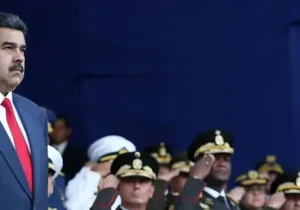On May 29 when one of the biggest perpetrators of the global financial crisis, and subsequently one of the largest beneficiaries of a U.S. taxpayer funded bailout, confirmed that it handed a blood-soaked economic lifeline to the authoritarian socialist government of President Nicolas Maduro in Venezuela. The U.S. banking giant Goldman Sachs bought $2.8 billion worth of bonds from Venezuelan state-owned oil giant Petroleos de Venezuela S.A. (known as PDVSA) at the unbelievable rate of 31 cents on the dollar.
The bond deal, which is worth $865 million when the discount is taken into account, will produce an incredibly high return for the wily and amoral trade if Maduro can somehow make Marxist economics work despite the failure of all who have tried before him. That said, Maduro now has time to figure out how to make it work, by learning from one of the best crony capitalist entities the world has ever seen: the post-2008 Goldman Sachs. Those responsible for this atrocious transaction would do well to read Proverbs 1:18-19, “These men lie in wait for their own blood; they ambush only themselves! Such are the paths of all who go after ill-gotten gain; it takes away the life of those who get it.”
There was a time when major U.S. banks understood their role in international politics and that they must wield their great power in a morally and ethically responsible manner that champions American Exceptionalism on the world stage. An example of banking’s better times was when J. Pierpont Morgan of J.P. Morgan & Co. did his part to help construct the Panama Canal, which in turn created countless jobs as the global flow of international trade was eased by this herculean feat of engineering and almost ungodly technological prowess. Back in 1903, J.P. Morgan & Co. was appointed as Panama’s fiscal agent. At the direction of President Teddy Roosevelt’s Treasury Department, J.P. Morgan & Co. arranged the transfer of $40 million worth of funds to the New Panama Canal Company. Later another financial industry stalwart, Citigroup, which was then known as National City Bank, assisted with the implementation of the Marshall Plan by providing commercial letters to facilitate shipments to countries receiving aid under the post-war economic stimulus plan.
During World War II, Goldman Sachs Chief Executive Officer Sidney J. Weinberg was appointed assistant director of the War Production Board by President Franklin D. Roosevelt. After Weinberg, several senior Goldman Sachs executives would follow into government service for multiple presidential administrations. Goldman partner Henry H. Fowler left the firm to become President Lyndon B. Johnson’s Secretary of the Treasury. In the Reagan Administration, Goldman Co-Chairman John C. Whitehead served as Deputy Secretary of State. Former Goldman Co-Chairman Robert E. Rubin served as Secretary of the Treasury under President Clinton, and then President George W. Bush would go on to tap former Goldman chief executive Hank Paulson to serve as his Secretary of the Treasury.
At the moment, the Trump Administration has several Goldman Sachs alums serving in senior positions. Trump’s Chief Strategist is the former head of Breitbart News, Stephen Bannon. Before his foray in D.C. media, Bannon was an investment banker with Goldman Sachs, which then led him to start his own boutique investment bank before joining Breitbart. Director of the National Economic Council, Gary Cohn, came to the White House after a 26-year career at Goldman Sachs culminating in a partnership and ultimately serving as President and Chief Operating Officer of the firm. Lastly, there is Steven Mnuchin, a former Goldman Sachs mortgage bond trader who spent 17 years at the Wall Street behemoth before going on to other business ventures up until he became Secretary of the Treasury.
Mnuchin in his brief tenure thus far as Secretary of the Treasury has taken merited, swift, and aggressive action against senior figures in the Venezuelan regime. In February, the Department of the Treasury’ Office of Foreign Assets Control (OFAC) branded Venezuelan Vice President Tareck El Aissami a “Specially Designated Narcotics Trafficker pursuant to the Foreign Narcotics Kingpin Designation Act (Kingpin Act).” As a result of the OFAC designation, Aissami is unable to access tens of millions of dollars’ worth of assets in the U.S., and Americans as well as American businesses are legally prohibited from pursuing any business ventures with Aissami or others in his inner circle. Then in May, OFAC once again hit the Venezuelan regime hard by sanctioning eight judges on the country’s Supreme Court of Justice. The judges stand accused of illegally undermining the power of the democratically-elected Venezuelan opposition-led National Assembly. Therefore, it is clear that while Mnuchin is himself a Goldman alum, his policymaking and actions as Secretary of the Treasury are in no way influenced by the decision-making at his old firm.
It is shocking that Goldman Sachs would be so reckless with its investment in Venezuela’s authoritarian regime given that the firm has a long history of its employees going into public service after their time with the bank. Hopefully the three aforementioned ex-Goldman employees turned Trump Administration heavyweights can privately remind their former colleagues of the bank’s storied tradition of public service and how deals, such as the one struck with Venezuela, puts the firm’s reputation at risk in a dangerous and unprecedented manner.
Pope Francis wisely stated in his Encyclical on Climate Change and Inequality:
Politics and the economy tend to blame each other when it comes to poverty… While some are concerned only with financial gain, and others with holding on to or increasing their power, what we are left with are conflicts or spurious agreements where the last thing either party is concerned about is…protecting those who are most vulnerable.
Ultimately, the true measure of a society and the character of its citizens is how it treats those that are most vulnerable. The Venezuela bond deal unfortunately confirms that even after the 2008 financial crisis, Goldman Sachs still has much to learn as a global corporate citizen, and on the other hand the Venezuelan regime has unsurprisingly confirmed that socialism is inherently an authoritarian and evil ideology that guarantees misery to all those that live under the darkness of a heartless few.
—
J.P. Carroll is a freelance national security and foreign affairs reporter and commentator based in Washington D.C. His reporting and commentary tend to focus on U.S. relations with Latin America and Europe. J.P. is a Providence and Red Alert Politics Contributor. Follow him on Twitter @JPCarrollDC1.
Photo Credit: Protest in London against Goldman Sachs buying bonds from Venezuela’s state-owned PDVSA. By Gerry Popplestone, via Flickr.
This article has been updated for clarity.







 Sponsor a student for Christianity & National Security 2024
Sponsor a student for Christianity & National Security 2024